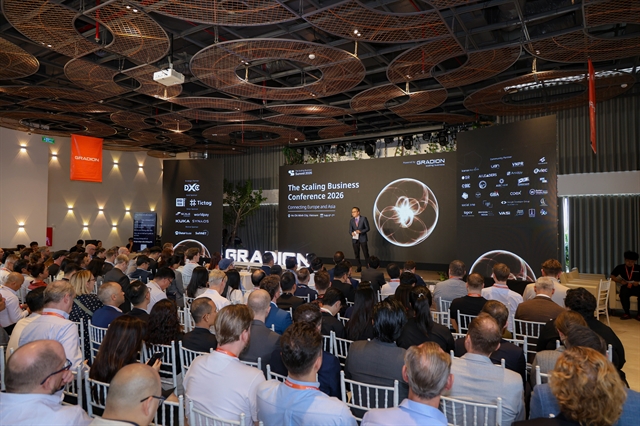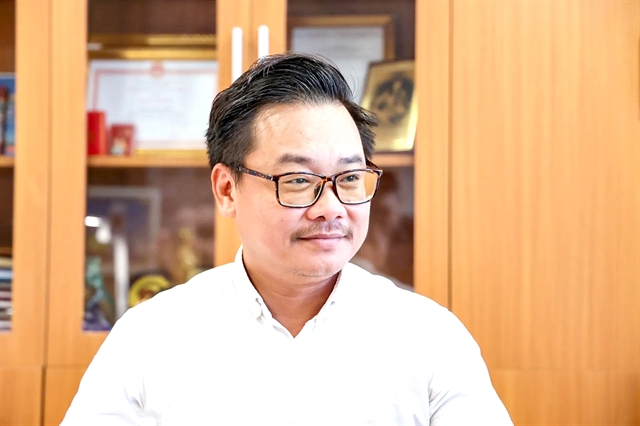 Economy
Economy

 |
| Lê Trung Hiếu, Deputy Director of Hà Nội’s Department of Finance. Photo nhadautu.vn |
Deputy Director of Hà Nội’s Department of Finance, Lê Trung Hiếu, talks with media about the capital’s outstanding foreign direct investment (FDI) performance in the first half of 2025 and its roadmap for sustainable, high-quality growth.
Hà Nội recorded the highest FDI inflow nationwide in the first six months of 2025. What factors do you believe have driven this remarkable growth?
The first half of 2025 marked a significant milestone for Hà Nội. The city attracted more than US$3.67 billion in FDI, up 216 per cent compared to the same period last year, and rose to first place nationwide.
This result reflects both the confidence of foreign investors and the effectiveness of the city’s investment environment. Of particular note, 89 projects expanded their investment, contributing more than $3.14 billion - a strong signal that existing investors are not only satisfied but ready to scale up their operations in Hà Nội.
Major expansions include projects by Gamuda Group of Malaysia, such as the Yên Sở Park and Gamuda Gardens developments, and ongoing large-scale urban projects like Nam Thăng Long and Lê Trọng Tấn–ParkCity.
In addition, Hà Nội continues to benefit from its strategic location, modern infrastructure and skilled workforce drawn from hundreds of universities and colleges. Our city also offers a large and dynamic consumer market with rising incomes, making it both a manufacturing and service hub attractive to international investors.
Beyond these short-term results, how would you describe Hà Nội’s broader strategy for FDI attraction?
Our approach is to attract investment selectively and sustainably. Hà Nội focuses on high-tech industries, R&D, clean manufacturing and high-value services, including finance and education.
We are developing infrastructure comprehensively - not only urban transport but also digital, energy and logistics networks - to meet the needs of investors. The city has also established special task forces to promptly address investors’ concerns and ensure projects proceed on schedule.
The direction is clear. We aim to build Hà Nội into a centre for innovation and high technology, particularly in semiconductors, smart city solutions, and green energy.
At the same time, we recognise that Hà Nội’s identity is deeply rooted in culture and creativity. With 1,350 craft villages, including more than 300 traditional ones, and export turnover of around $250 million a year, our craft industry not only preserves cultural values but also creates jobs for about one million rural workers. These are unique advantages that few capitals in the world possess.
The city’s FDI inflows are impressive, but how effective is project implementation and disbursement?
This is a point of pride for Hà Nội. In the first six months of 2025, FDI disbursement reached around $1.46 billion, showing that capital is being effectively turned into production and business activities.
The significant increase in additional investment, exceeding $3.1 billion, indicates that existing projects are performing well and that investors have long-term confidence in the local business environment.
We continue to streamline administrative procedures, simplify licensing, and support investors throughout the project lifecycle, from registration to land clearance and implementation. Our goal is to ensure that every committed dollar becomes a real contribution to the economy as quickly and efficiently as possible.
How does the revised Capital Law contribute to Hà Nội’s investment attraction and development?
The Capital Law (amended), which took effect in June 2024, is a game changer for Hà Nội. It provides a new legal framework with special mechanisms and greater autonomy for the city in land management, planning and investment incentives.
This allows Hà Nội to offer more competitive and flexible policies, shorten administrative timelines, and improve transparency in decision-making. In July 2025, the City People’s Council also passed a resolution on attracting strategic investors, laying out priority sectors and clear investment criteria.
These policies enable us to focus resources on high-tech, green and sustainable industries - in line with our vision of developing Hà Nội as a smart, green and modern capital. The new law also facilitates the transfer of advanced technologies and the recruitment of high-quality human resources, which are essential to improving the overall quality of FDI.
Hà Nội’s FDI structure differs from that of other localities. How do you see this as an advantage?
While many provinces attract FDI mainly in labour-intensive manufacturing, Hà Nội has a diversified structure. Real estate accounts for about 36.5 per cent of total FDI, manufacturing around 23.6 per cent, and trade and services about 12.4 per cent.
Notably, scientific and professional activities, including R&D, account for over 12 per cent of total capital, indicating that Hà Nội is becoming a magnet for knowledge-based and high-value industries.
Our next goal is to enhance this transition toward high-tech sectors such as chips, semiconductors, AI and IoT, which will generate stronger linkages with domestic enterprises and help elevate Hà Nội’s role as a knowledge-driven economy.
The city is expected to undergo administrative restructuring into a two-tier system. How will this impact investment attraction?
This restructuring will bring many opportunities. Streamlining administrative units will reduce overlap, improve governance efficiency and accelerate service delivery.
It will also help expand development space, creating more land resources for industrial and urban projects, especially in suburban areas. Improved regional connectivity will facilitate logistics and workforce mobility.
Most importantly, a larger, more efficiently governed capital with better infrastructure and quality of life will naturally attract high-calibre talent and high-tech investors.
With our existing strengths, supportive policies, and clear development orientation, Hà Nội is poised not only to maintain its lead but to move closer to its vision of becoming a leading investment and innovation centre in the region.
What will be the city’s priorities to maintain this momentum?
We will continue to pursue selective FDI attraction, focusing on projects with advanced technologies, environmental responsibility and technology transfer commitments. At the same time, Hà Nội will intensify its investment promotion activities abroad and on-site - especially targeting partners from Japan, Singapore, South Korea, Malaysia, China, and Taiwan.
The spirit that guides us is to act 'quickly but not hastily' - balancing the desire for rapid progress with a commitment to sustainable, long-term development.
Ultimately, our success depends not only on attracting capital but also on building trust among investors, businesses, and the people of Hà Nội, to create a prosperous, modern, and liveable City for generations to come. VNS




